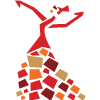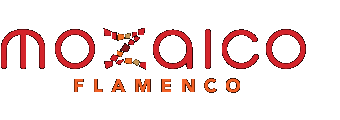Mozaico Manifesto: What is Mozaico Culture?
Find out how we define ourselves!
Results of first community meeting, Sunday September 30, 2007
By Kasandra “La China”

On Sunday September 30, 2007, Oscar and I hosted our first community meeting, to brainstorm the “Mozaico Manifesto”. We were overwhelmed with the support of thirty participants who gave us their heartfelt thoughts about our school! We were really touched to see members of our musical community come out — Luis Guiterrez, Pirouz Ebadypour, Gerardo Alcala, Stephanie Pedraza and Kourosh Saysan, who took a ferry all the way from Victoria to join us! And of course, thanks to our wonderful students at AMFDA for potluck and participating. Everyone clearly is crazy about Flamenco and cares about our future. Thanks so much!
It was fitting that we gathered in September because it marks the fifth year anniversary of Al Mozaico Flamenco Dance Academy! Oscar and I formed Al Mozaico Flamenco Dance Academy in 2002! When we did so, we were bright eyed, nervous and very “green”. I told him, if we survive the first five years, we would need to formalize and streamline the organization at that point. Well, here we are at five years, going strong. Our business continues forward and we find ourselves with more than 100 weekly students this term!
We are proud of our people! Many newcomers who come to our Vancouver flamenco performances often comment on the strong sense of community they feel at Mozaico Flamenco. Whether at our El Jaleo performances at the school, our annual student shows or even our website, people always say they get a very warm feeling from us and feel that they can be included in what we are doing.
Why is this?
What are we doing?
How do we define ourselves?
What makes our organizational culture different?
Everyone broke into discussion groups to discuss how we define our identity and culture in the Mozaico Manifesto.

Describe the personality, character or essence of Mozaico Flamenco
- Inclusive of all people
- Multicultural, diverse – a melting pot of different cultures
- Supportive of everyone
- Respectful of all people
- Ready and willing to be open
- Willing to listen to individuals’ needs and goals
- Generous with knowledge
- Wise and passionate about all aspects of flamenco (dance, song, music etc.) – rich in knowledge, very open to integration of all skills – the big picture at all levels
- Acknowledge that we are all still learning and growing, even the teachers
- Co-operative environment, not competitive
- Accepting, welcoming, friendly
- Female-dominated – could use more men…
- People are so nice
- There is a sense of humour, people don’t take themselves too seriously
- High standards of integrity and professionalism
- Strong community
- Students are not unreasonably or artificially limited – they are encouraged to be challenged
- Not monopolizing of the community – ie: Mozaico is part of the larger flamenco community in Vancouver, and doesn’t strive to undercut anyone or any other part of the community.
- Non-judgmental, unprejudiced – students don’t fear asking for help
- Enthusiastic
- Fosters connections between people
- “Flamenco is a way of life”
- An educational institution instead of a commercial establishment
- Promotes individualized learning “at your own pace”, there’s no pressure to “keep up”
- Students are challenged to reach their potential
- Freedom – there are no imposed limitations, creative freedom is encouraged and appreciated.
- Students are encouraged to learn from each other
- Challenge – ability is pushed to the next level
- Ample studio space
- Very capable instruction
- Warm and friendly atmosphere
- Positive and respectful attitude toward the art form
- Open-mindedness, not rigid
- High degree of tolerance and acceptance – you can be yourself
- Integration of music (cante, guitar) and dance, even at beginner levels
- Meeting people – connecting with others
- Get-togethers, socializing
- True sense that the teachers appreciate the musicians and their roles
- Equality of all people involved in all aspects of flamenco – dancers, singers, musicians
- Honours different ways of learning
- Openness and acceptance – people can bring their kids, dogs etc.
- Sense that our teachers know us and care about us as individuals, even outside of class – we represent more than just a paycheque
- It’s casual, like a family and the caliber of instruction is very high
- Passion for life
- Everyone is friendly when you walk in to the room
- The instructor’s tone of voice is always respectful
- Questions are welcomed without defensiveness
- Like a family
- Inclusive of all styles of flamenco: contemporary, clasico etc – it’s a mosaic!
- Non-judgmental
- Non-competitive, not catty
- Non-hierarchical
- People are treated equally and fairly
- Never condescending
- Fosters respect
- Friendly
- Supportive
- Open
- Enthusiastic and passionate about flamenco
- Integrative
- Not rigid – students can attend any class and are not restricted from trying more advanced levels
- Students learn from each other – classes sometimes have a broad mix of levels in them. This is positive
- Warm and welcoming. The instructors are always glad to see you
- Positive
- Perspective and world-view is in tune with that of the students
- Good sense of camaraderie
- Respectful
- Promotes and encourages students to develop friendships at all levels
- Warm
- Friendly
- Tolerant
- Respectful
- Multicultural
- Professional
- Organized
- High expectations of students and staff
- Forward-thinking
- Worldly
- Edgy
- Welcoming
- Students are self-motivated
- Diverse: different ages, bodies, abilities, backgrounds
- Committed
- Loyal
- Down-to-earth
- Proud to be part of the school and the community
- One person’s success reflects on everyone – we all share the glory of each person’s personal triumph
- Mature – people relate to one another like adults
- Always growing, changing, morphing – there are always new people
- Passionate
- Supportive
- Allows questions and differing opinions without getting defensive
- Often student’s questions, needs, determine the direction of the class
- Welcoming
- Allows each person to find his/her passion for flamenco in his/her own way
- Empowering
- Non-competitive, co-operative
- Free speech
- Students are taught to express their individuality
- Strong, open community
- Students receive a broad education in the art form and gain real understanding – dancers are not just spoon-fed choreography
- Teachers want the students to learn – they don’t hold back their knowledge
- Genuine love of the art form
- All students are given opportunities to perform
- Diversity of learning – technique, music etc.
- Multicultural / multiracial
- Non-controlling, not restrictive
- It’s okay to make mistakes
- Open to change
- Fabulous studio space
- Flexible – allows for individual and personal growth. Not rigid
- Innovative
- Good balance between traditional and contemporary flamenco
- Progressive – while there is respect for tradition, this school is not afraid to blaze new trails
- Fosters a sense of community

What are some aspects of Al Mozaico Flamenco Dance Academy that you enjoy?

Please describe the environment at AMFDA.

Please describe the people and the culture.

What differentiates our school?
Some critisicms were:
1. Where are the men?
Flamenco is female dominated, probably 100 women every 2-4 men. We realize this but this has always been the case in flamenco dancing. Flamenco dance is attractive to women, because it is empowering and emotional, you don’t need a partner, costumes are great and you are given permission to be a strong, defiant, proud person. It has never been a 50-50 mix in the flamenco world because we do not need a partner.
I would be open to ideas on how include more men. I think that as the community grows, we provide workshops for aficionados and more musicians are included into our mix, there will be more male influence.
FYI: OUR FIRST AFFICIONADO WORKSHOPS ARE BEING PRESENTED ON OCTOBER 21, SUNDAY SPECIFICALLY TO “GET MORE MEN”. TELL YOUR BOYFRIENDS, HUSBANDS, FAMILY AND FRIENDS TO GET INVOLVED WITH PALMAS AT 12:15pm AND CAJON at 2:00pm.
2. Sometimes students can feel disconnected from other dancers and artists.
While this may be true for a few, this is statement is entirely dependent on how much you hang out at the studio, how long you have been around, how many classes you take during the week, if you are going to Por Fiesta Masterclasses, if you are socializing in your class, forming practise groups and if you are trying to participate in events such as El Jaleo, Christmas Recital, juergas at Oscar’s, Kino Cafe and volunteering. I would like to encourage newcomers to get involved. Regular flamenco junkies are at our studio 2-4x a week, it is their main hobby, passion and addiction. Therefore, spending a lot of time at the studio various days, they have a great social network and camaraderie. Some classes have live musicians, some work with CD. Always ask your instructor what classes are working on at the beginning of the term.
If interacting with dancers and musicians is important to you, I suggest joining our POR FIESTA CLASSES. Bulerias and Tangos are presented in a very organic format, with live musicians and all the flamenco chaos. You will definitely connect with people here as opposed to a technique class.




Leave a Reply
Want to join the discussion?Feel free to contribute!